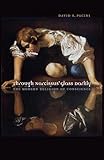Through Narcissus' Glass Darkly : The Modern Religion of Conscience / David S. Pacini.
Material type: TextPublisher: New York, NY : Fordham University Press, [2022]Copyright date: ©2009Description: 1 online resource (222 p.) : 7 Illustrations, black and whiteContent type:
TextPublisher: New York, NY : Fordham University Press, [2022]Copyright date: ©2009Description: 1 online resource (222 p.) : 7 Illustrations, black and whiteContent type: - 9780823229642
- 9780823293407
- online - DeGruyter
| Item type | Current library | Call number | URL | Status | Notes | Barcode | |
|---|---|---|---|---|---|---|---|
 eBook
eBook
|
Biblioteca "Angelicum" Pont. Univ. S.Tommaso d'Aquino Nuvola online | online - DeGruyter (Browse shelf(Opens below)) | Online access | Not for loan (Accesso limitato) | Accesso per gli utenti autorizzati / Access for authorized users | (dgr)9780823293407 |
Frontmatter -- Contents -- List of Figures -- Acknowledgments -- Notes and Abbreviations -- Prologue: The Looking Glass Religion -- 1. Unscaffolding Religious ‘‘Madness’’ -- 2. Disenchantment and the Religion of Conscience -- 3. Disfiguring the Soul -- 4. Life Without Enigmatic Remainder -- Epilogue: The Shattered Mirror -- Notes -- Name Index -- Subject Index
restricted access online access with authorization star
http://purl.org/coar/access_right/c_16ec
Through Narcissus' Glass Darkly presents a genealogy and critique of the ideal of conscience in modern philosophical theology, particularly in the writings of Hobbes, Rousseau, and Kant. It shows why the apparently emancipatory rejection of heteronomy compromised the ideal of self-legislated freedom. David Pacini argues that, despite its advocacy of the popular political value of common understanding, the modern religion of conscience has become the Achilles' heel of both Kantian and Freudian thought. It is doomed to succumb to its own fundamentally narcissistic or self-relating orientation. Avoiding the tenacious cliché that the luminaries of modern philosophy simply replaced God with the self, David Pacini argues that the modern religion of conscience emerges out of a far more radical kind of disenchantment, one in which both God and self are de-divinized. Bereft of divinity, the God of modernity becomes empty; the self of modernity, in its autonomy, becomes hopelessly tied to dissociation from origins and to loss of a world. Left only to itself, the conscientious individual has only the world it legitimates through self-relating. But given that any other world is inconceivable, the conscientious individual can never know whether its world is just or merely the expression of self-interest. Paradoxically, Pacini argues, the most formidable proponents of the modern religion of conscience share with their critics a common problem: the self-legislating self has become both indispensable and impossible within much of modern philosophy and theology. This unique and interdisciplinary interpretation of conscience makes an important contribution for scholars and students of modern philosophy, Christian theology, psychoanalytic theory, and literary criticism.
Mode of access: Internet via World Wide Web.
In English.
Description based on online resource; title from PDF title page (publisher's Web site, viewed 03. Jan 2023)


